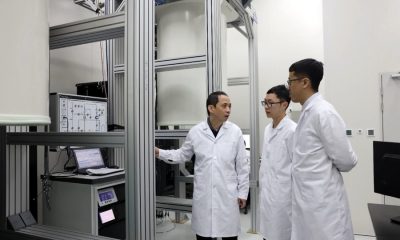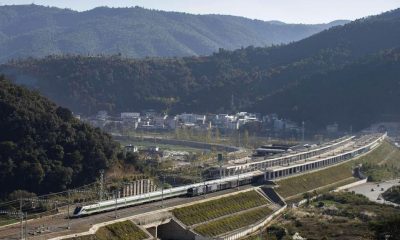Foreign
China, Africa to advance great endeavors of win-win cooperation, harmonious coexistence, shared prosperity of civilizations

By He Yin, People’s Daily
Chinese President Xi Jinping and his South African counterpart Cyril Ramaphosa recently co-chaired the China-Africa Leaders’ Dialogue in Johannesburg. Together with other African leaders, they drew a new blueprint for China-Africa solidarity and cooperation.
The meeting adopted and issued the Joint Statement of the China-Africa Leaders’ Dialogue, which reflected the extensive consensus between China and Africa on strengthening and reforming global governance, promoting Africa’s socioeconomic development, safeguarding peace and security, and advancing the institution building of the Forum on China-Africa Cooperation (FOCAC).
The document charted the course for the future development of China-Africa relations in the new era, injecting new impetus into the China-Africa friendship.
China and Africa, through their creative explorations for modernization, are giving answers to the questions of the times, and making joint efforts to advance the great endeavors of win-win cooperation, harmonious coexistence and shared prosperity of civilizations, said Xi in a keynote speech at the China-Africa Leaders’ Dialogue.
He stressed that the two sides must work together to promote a just and equitable international order, safeguard a peaceful and secure global environment, build an open and inclusive world economy, and create a sound environment for realizing their respective development visions.
Xi profoundly expounded on the significance of China and Africa joining hands to advance modernization and proposed concrete measures to strengthen pragmatic cooperation in the next phase, to support African integration, and to facilitate African modernization. This will inject new impetus into elevating China-Africa relations to new heights and the building of a China-Africa community with a shared future.
There are various paths leading to modernization. The African people have the most say on which path suits Africa best. Advancing modernization through integration is the independent choice made by African countries and people. On this path to modernization, China has all along been a firm supporter, and walking side by side with Africa.
Over the years, China has helped Africa build a large number of connectivity infrastructure projects and carried out extensive cooperation with the African Union and sub-regional organizations. Batches of cooperative projects have taken root in Africa, renewing China-Africa friendship across the vast lands of China and Africa.
Ramaphosa remarked at the China-Africa Leaders’ Dialogue that South Africa has benefited immensely from Africa-China cooperation, and this relationship is one of mutual accomplishment and win-win cooperation.
At the Dialogue, Xi announced that China will launch the Initiative on Supporting Africa’s Industrialization, the Plan for China Supporting Africa’s Agricultural Modernization, and the Plan for China-Africa Cooperation on Talent Development.
China plans to train 500 principals and high-caliber teachers of vocational colleges every year, and 10,000 technical personnel with both Chinese language and vocational skills for Africa. China will invite 20,000 government officials and technicians of African countries to participate in workshops and seminars.
Focusing on industrialization, agricultural modernization, and personnel training urgently needed for Africa’s modernization, the three initiatives and plans vividly reflect China’s concrete actions to support African development.
African leaders said that Chinese investment in and cooperation with African countries has played an important role in boosting Africa’s development, and China is Africa’s indispensable cooperation partner in its quest for modernization.
In face of the profound changes unseen in a century, a strong China-Africa relationship and productive China-Africa cooperation will provide more fresh impetus to global development and ensure greater stability of the world. This is an international responsibility and historical mission entrusted to the 2.8 billion Chinese and African peoples.
Bearing in mind the internal potential and external challenges of China-Africa cooperation, Xi emphasized that through Belt and Road cooperation and the FOCAC, and in light of the Agenda 2063 of the African Union (AU), China will work with Africa to enhance the synergy of their development strategies.
He reiterated China’s support for African Union in joining the G20, which fully mirrored China’s backing for Africa to elevate its international standing and voice and China’s concrete action of putting the spirit of China-Africa friendship into practice.
African leaders appreciated China’s proposals to promote Global Development Initiative, Global Security Initiative and Global Civilization Initiative in support of multilateralism, and believe China and Africa’s development will bring more opportunities for world peace and development.
Deeper African integration coupled with the steady modernization progress of both China and Africa will provide new impetus for global economic growth, contribute positive energy to international fairness and justice, and set new benchmarks for equal, open and cooperative partnerships worldwide.
China will work with African countries to further carry forward the spirit of China-Africa friendship and cooperation, deepen solidarity and collaboration across the board, and build a high-level China-Africa community with a shared future, so as to make new contributions to advancing human modernization and prosperity.
Foreign
China’s new chapter in global innovation

By Gu Yekai, Liu Yiqing, People’s Daily
At a smart construction project site managed by China State Construction Engineering Corporation, a quiet technological revolution is underway. Amid cranes and concrete, engineers are deploying advanced artificial intelligence (AI) systems that could fundamentally reshape the construction industry.
Li Fengjian, an AI specialistwith Xianyuan Technology, detailed how the company’s latest intelligent system – built on a large model – adapts to complex construction environments.”Engineering machinery equipped with intelligent agents can adjust its operations automatically in response to weather conditions,” Li explained, adding that a spatiotemporal sensing network further enhances the system, providing real-time tracking of both personnel and materials throughout the construction site.
In February this year, Xianyuan Technology rapidly integrated its self-developed model with DeepSeek-R1, effectively blending a general-purpose framework with industry-specific models. This integration, Li noted, has produced a solution capable of delivering expert-level performance in challenging, dynamic environments. The firm is based in the Shanghai Foundation Model Innovation Center, aburgeoning AI incubator that now hosts over 200 innovative enterprises.
China’s technological transformation extends well beyond the construction sector. Overthe past three decades, the country has evolved from its initial forays into internet connectivity to becoming a key player in global digital innovation.
Here, a steady stream of technological innovations are emerging, from the early days of emails and web browsing to the cutting-edge technologies represented by DeepSeek and the dynamic evolution of social media.
Wu Jianping, an academician at the Chinese Academy of Engineering and headof the Zhongguancun Laboratory, pointed out that while China had introduced only one internet standard before 2005, it now contributes to over 200 worldwide. Such strides illustrate the country’s concerted push toward high-level technological self-reliance – a journey marked by both persistence and determination.
Beyond the digital realm, China is makingsignificant inroads in aerospace, new energy, and other high-tech sectors. It has transitioned from being a follower to standing shoulder-to-shoulder with global leaders, and in some areas, even taking the lead. Wu attributed these achievements to a dynamic ecosystem of policy reforms and talent cultivation that encourages creativity and technical expertise at every level.
Amid intensifying international competition, collaborative research and the integration of new technologies with traditional industries are central to China’s high-quality economic development.
Mei Linhai, a researcher at China’s State Key Laboratory of Cognitive Intelligence, remarked that the age of AI calls for continuous exploration. “In this era, everyone is an innovator. Only by persistently pushing the boundaries can we remain at the forefront of both technological and industrial development,” Mei observed.
In the field of general-purpose AI, Mei emphasized that independent innovation is paramount. He advocates for a self-driven industrial ecosystem that leveragesbreakthrough technologies to boost productivity and unlock new possibilities, Mei said.
Foreign
Chinese democracy in action:a village bench meeting shapes national law

By Wei Zhezhe, Liu Botong, People’s Daily
In a modest corner of Jiangmen, south China’s Guangdong province, residents of Weidong village are experiencing firsthand a form of democracy that starts at the grassroots level and reverberates all the way to Beijing.
Wu Tengxin, a local villager who relies on a scooter for daily mobility after contracting polio, recalls a time when the village’s public spaces were ill-equipped for people with disabilities. Now, thanks to a simple suggestion made during a meeting, his everyday life has changed.
In November 2022, a team from a local legislative outreach office – a branch of China’sNational People’s Congress (NPC) – visited Weidong village and set up a “bench-style meeting.” Residents, including the elderly and those with disabilities, gathered to voice their concerns about inadequate accessibility.
Amid the conversation, Wu offered a straightforward proposal: “I hope rural accessible facilities can be improved to make mobility easier for people with disabilities and the elderly.” His words were relayed verbatim to lawmakers.
The response was swift. On June 28, 2023, at the third session of the 14th NPC Standing Committee, legislators passed a law on building a barrier-free living environment. The law stipulates that improvements”shall align with social and economic development levels, coordinate urban and rural progress, and gradually narrow the gap in infrastructure between urban and rural areas.”
Today, Wu observes that the village’s main roads and public squares have been upgraded with accessibility features that make getting around considerably easier.
This episode illustrates what Chinese officials call “whole-process people’s democracy” – a system where citizen input is woven into every stage of policy development.
Jilie Ziri, head of Abuluoha village in Butuo county, southwest China’s Sichuan province, remarked that for young generations in China, democracy has become a lived experience. “Villagers are the masters of village affairs,” he said, emphasizing how active villager participation has injected new vitality into local governance.
Experts point to consultative democracy as a cornerstone of this process. Tao Kaiyuan, vice chairman of the Central Committee of the China Association for Promoting Democracy and vice president of the Supreme People’s Court, underscores the important role of the Chinese People’s Political Consultative Conference, whose members hail from every stratum of society and bring a wealth of expertise and connections.
Their regular forums, field research, and public consultations have created robust channels for citizens to contribute ideas and forge consensus.”This approach gathers collective wisdom and transforms public voices into policy,” Tao said.
Another crucial manifestation is the effectiveness of China’s political party system. Under the leadership of the Communist Party of China, Chinese democratic parties actively fulfill their duties, offering recommendations that often translate into concrete policy decisions. This integrated approach demonstrates the unique strengths of China’s political system and the advantages of whole-process people’s democracy.
Tao emphasized that whole-process people’s democracyhas evolved into an efficient and dynamic democratic practice – one that not only reflects the essence of socialist democracy but also presents a pioneering model of political civilization, contributing Chinese wisdom and solutions to global governance and democratic development.
Foreign
Chinese modernization: blueprint for global progress

By He Yin, People’s Daily
At China’s recent annual “two sessions,” Chinese modernization once again captured global attention. International observers are closely following a range of new measures designed not only to accelerate Chinese domestic transformation but also to unlock fresh opportunities for global development.
They believe that Chinese modernization, built on a foundation of openness and cooperation, will continue to yield global benefits with each new milestone.
Today, China stands as a formidable force in the global economy – accounting for around 18 percent of the global economy and nearly 30 percent of world manufacturing output. Year after year, the nation has contributed about 30 percent to global economic growth. With import and export records with almost all countries and regions designated in the United Nations Statistics Division, the country is a major trading partner for more than 150 countries and regions. In 2024, its exports to over 160 countries and regions saw growth.
Often hailed as the “world’s largest developing country,”the “second-largest economy,””world’s factory,””global market,” and “innovation powerhouse,” China is increasingly viewed as a beacon of stability and progress.
In recent years, high-profile events such as the seventh China International Import Expo – where intended deals exceeded $80 billion – and the establishment of over 1.239 million foreign-invested enterprises have reinforced the nation’s reputation as a vast, dynamic market.
Meanwhile, policies encouraging Chinese companies to “go global” have seen a steady stream of new technologies, goods, and services permeate international markets, knitting the country ever tighter into global value chains and bolstering its commitment to win-win cooperation.
The influence of Chinese modernization is evident far beyond its borders. In the Central African Republic, President Faustin-Archange Touadera has repeatedly screened China’s political documentary Carry the Reform Through to the End for cabinet discussions, while officialsin Uzbekistan are adapting China’s poverty-reduction experience to suit their national context. These moves challenge the assumption that modernization must follow Western models, suggesting that China’s alternative pathway offers a viable route to development.
Beyond economic growth, Chinese modernization is increasingly celebrated for its potential to foster win-win cooperation and shared prosperity.
Under the Belt and Road Initiative (BRI), for example, Kazakhstan secured its first maritime access and Laos launched its first modern railway. Support from the Global Development and South-South Cooperation Fund has propelled over 160 projects, benefiting more than 30 million people. Moreover, China has given all the least developed countries with which it has diplomatic relations zero-tariff treatment for 100 percent tariff lines, signaling its commitment to an open and inclusive global economy.
China’s modernization agenda also tackles global challenges head on. In response to global environmental risks, China advocates for building a community of all life on the Earth. To bridge the digital and AI divide, it has launched the AI Capacity-Building Action Plan for Good and for All to ensure that technological advancements benefit every corner of the globe.
On the security front, China continues to promote dialogue and reconciliation in conflict zones while engaging in multilateral security collaborations, reinforcing its reputation as a nation committed to peace and stability.
By proposing initiatives such as the Global Development Initiative, the Global Security Initiative, and the Global Civilizations Initiative, China is not just charting its own course toward modernization but championing an equal and orderly multipolar world and a universally beneficial and inclusive economic globalization – one that seeks to ensure that no nation is left behind on the path to prosperity.
The global appeal of Chinese modernization is far from accidental. Decades of reform and opening up have accelerated its development while enabling the country to contribute to global governance. On the international stage, it has taken on a leadership role – actively shaping global norms, building a community with a shared future for mankind, and advancing world peace and development. By sharing its successful experiences and technological advancements, the country seeks to help other developing countries chart their own courses toward progress.
With over 1.4 billion people engaged in this modernization journey – a number that surpasses the total population of all developed countries combined – China’s approach is redefining the global modernization landscape. For China, modernization is not solely a national endeavor but a blueprint for global progress – a vision that promises a more inclusive future for all.
-

 News15 hours ago
News15 hours agoN10bn Alleged Loot: EFCC Probes SGF Akume’s PA ,Torhile Uchi
-

 Foreign13 hours ago
Foreign13 hours agoSmall packages, big Momentum: how logistics reflects China’s economic strength
-

 Foreign13 hours ago
Foreign13 hours agoChina’s meteorological early warning solutions benefit the world
-

 Foreign12 hours ago
Foreign12 hours agoChina’s economic resilience: overcoming challenges, advancing with confidence
-

 Foreign12 hours ago
Foreign12 hours agoHigh-quality Belt and Road cooperation create opportunities for global growth
-

 Foreign11 hours ago
Foreign11 hours agoChinese democracy in action:a village bench meeting shapes national law
-

 Foreign12 hours ago
Foreign12 hours agoChinese modernization: blueprint for global progress
-

 Foreign11 hours ago
Foreign11 hours agoChina’s new chapter in global innovation





